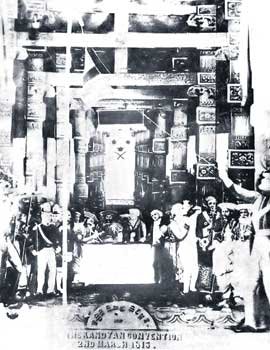As interpreted by Indika Shabandu, Magulmaduwa is not merely a royal audience hall—it is a living symbol of international moral law, rooted in the Buddha Sasana tradition and the universal Dhamma order of Emperor Ashoka. It is here that two civilizations once met in a righteous accord to protect a just and compassionate way of life.
On 2 March 1815, this site bore witness to the British surrender under the Kandyan Convention—a moment that, while framed as a treaty, was later questioned by voices of conscience, including a Wesleyan priest who accused the British of aligning with “Mittaya Dusti,” a betrayal of both spiritual and ethical values.
This moment stands in contrast to the Treaty of Tordesillas (1494), where Spain and Portugal divided the non-Christian world between them under religious pretense—ignoring the dignity of indigenous peoples. That treaty was a product of empire; Magulmaduwa was a call to conscience.
As UN High Commissioner for Human Rights Volker Türk visits Sri Lanka from 23–26 June 2025, it is imperative that he not bypass this sacred site. Magulmaduwa offers a rare opportunity to witness a historical moment where peace was not imposed, but emerged through Dhamma—a path of compassion, justice, and shared humanity.
Let this visit mark not only a diplomatic mission, but a spiritual awakening—a reminder that true peace begins where power bows to principle, and where the dignity of all people is honored above doctrine or empire.
As shared by Indika Shabandu, a direct descendant of Kivulegedara Mohottala, the righteous fight to protect Dhamma was not abstract—it ran through families, villages, and ancestral duty. His mee mutta, a key leader in the Sinhala army, stood against inhumanity during the Uva-Wellassa Rebellion—not to claim power, but to uphold the spiritual dignity of a people and their land. If such a figure were alive today, he would be a witness—not only to global peace narratives—but to the deep hypocrisy still embedded in many Western-led human rights efforts, where agendas are often cloaked in moral language but divorced from humanity itself. The very forces that once suppressed sovereignty under colonial flags now speak of justice from podiums—while overlooking sacred truths like those enshrined at Magulmaduwa. It is here, not in distant policy rooms, that the true blueprint for peace was written—not as conquest, but as a righteous accord. Not as doctrine, but as living Dhamma.
Every defender of fundamental rights, every voice raised for human dignity, and every advocate of peace must not overlook Magulmaduwa. This sacred hall, where the Kandyan Convention was signed, holds a profound moral legacy that demands deep study—not just as history, but as a living lesson in ethical governance. In the spirit of Article 9 of Sri Lanka’s Constitution, which mandates the protection and fostering of the Buddha Sasana, this site offers a unique opportunity to understand how peace can emerge through Dhamma—not doctrine.
As an author who has deeply conversed with Indika Shabandu, I carry a profound understanding of his thought, though I humbly recognize the limits of my conceptual capacity. Still, I firmly believe that Magulmaduwa is not just adjacent to the Temple of the Sacred Tooth Relic—it is spiritually intertwined with it. It channels the very essence of Buddha Dhamma, embodied in place, memory, and moral law. To ignore this location is to miss a radiant thread that runs through the heart of our civilization and extends outward to the conscience of the world.
Before claiming the title of a global leader, one must first learn to be truly human. The world cries out for compassion over conquest. It is not enough to speak of peace—we must stop war in all forms, and stand where peace was once forged in spirit, not in strategy.
“Can a virtuous person recognize a wicked one, while a wicked person cannot recognize the virtuous?”
By PalithaAriyrathna

